AMD Radeon HD 7870 GHz Edition & Radeon HD 7850 Review: Rounding Out Southern Islands
by Ryan Smith on March 5, 2012 12:01 AM ESTOverclocking: Power, Temp, & Noise
As with the rest of Southern Islands, AMD is making sure to promote the overclockability of their cards. And why not? So far we’ve seen every 7700 and 7900 card overclock by at least 12% on stock voltage, indicating there’s a surprising amount of headroom in these cards. The fact that performance has been scaling so well with overclocking only makes overclocking even more enticing. Who doesn’t want free performance?
So how does Pircairn and the 7800 series stack up compared to the 7700 and 7900 series when it comes to overclocking? Quite well actually; it easily lives up to the standards set by AMD’s previous Southern Islands cards.
| Radeon HD 7800 Series Overclocking | ||||
| AMD Radeon HD 7870 | AMD Radeon HD 7850 | |||
| Shipping Core Clock | 1000MHz | 860MHz | ||
| Shipping Memory Clock | 4.8GHz | 4.8GHz | ||
| Shipping Voltage | 1.219v | 1.213v | ||
| Overclock Core Clock | 1150MHz | 1050MHz | ||
| Overclock Memory Clock | 5.4GHz | 5.4GHz | ||
| Overclock Voltage | 1.219v | 1.213v | ||
Overall we were able to push our 7870 from 1000MHz to 1150MHz, representing a sizable 15% core overclock. This is now the 3rd SI card we’ve hit 1125MHz or 1150MHz – the other two being the 7970 and the 7770 – so AMD’s overclocking headroom has been extremely consistent for their upper tier cards.
As for memory overclocking, we hit 5.4GHz on both cards before general performance started to plateau, representing a 12.5% memory overclock. Considering that both cards use the same RAM on the same PCB, and the performance limitation is the memory bus itself, this is consistent with what we would have expected. With that said, we are a bit surprised that we got so far over 5GHz on 2Gb GDDR5 memory chips only rated for 5GHz in the first place; it indicates that Hynix’s GDDR5 production very mature.
With that said, because of the unique and non-retail nature of the 7850 AMD supplied us, the 7850 overclocking results should be considered low-confidence. The retail 7850 cards will be using simpler and no doubt cheaper coolers, PCBs, and VRMs; all of these can reduce the amount of overclocking headroom a card has. It’s by no means impossible that a 7850 could hit 1050MHz/5.4GHz, but it’s far more likely on a 7870 PCB than it is on a 7850 PCB.
Anyhow we’ll take a look at gaming performance in a moment, but in the meantime let’s take a look at what our overclocks do to power, temperature, and noise.
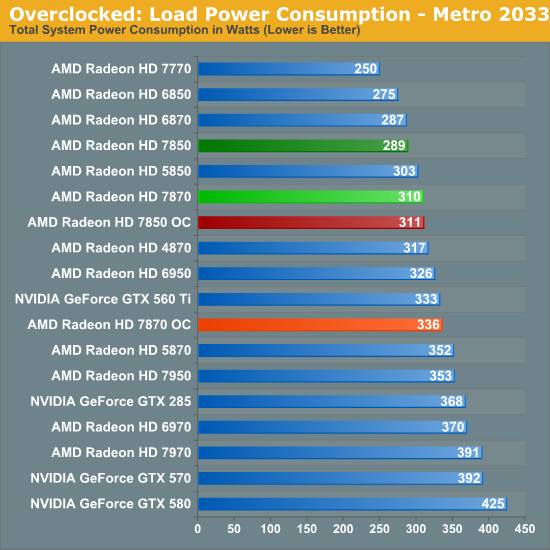
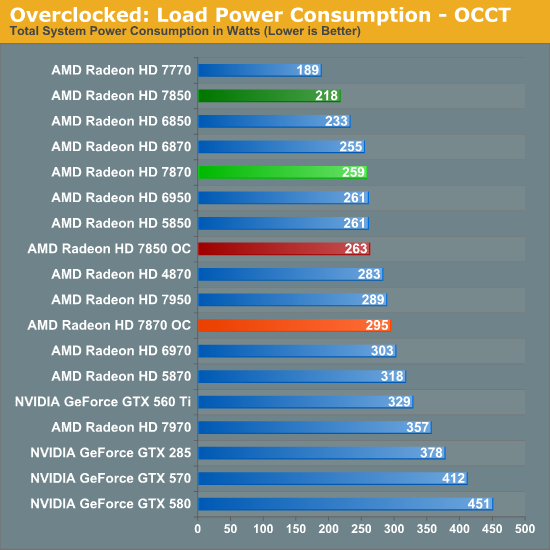
Even without a voltage increase overclocking does cause power consumption to go up, but not by a great deal. Under Metro the total difference is roughly 21W for the 7850 and 25W for the 7870, at least some of which can be traced back to the increased load on the CPU. Whereas on OCCT there’s a difference of nearly 40W on both cards, thanks to the increased PowerTune limits we’re using to avoid any kind of throttling when overclocked. All things considered with our overclocks power consumption for the 7850 approaches that of the 7870 and the 7870 approaches the GTX 560 Ti, which as we’ll see is a fairly small power consumption increase for the performance increase we’re getting.
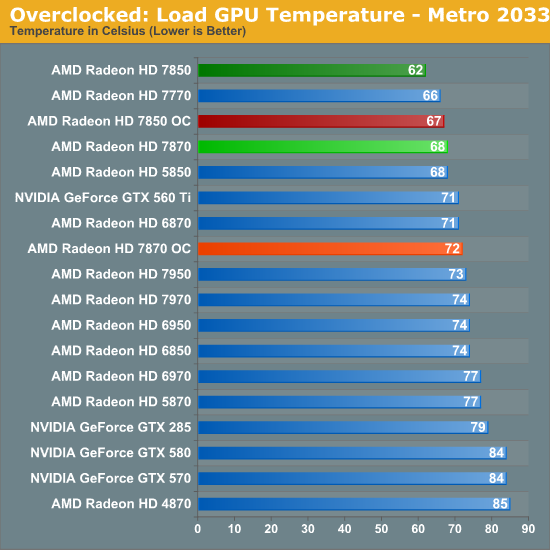
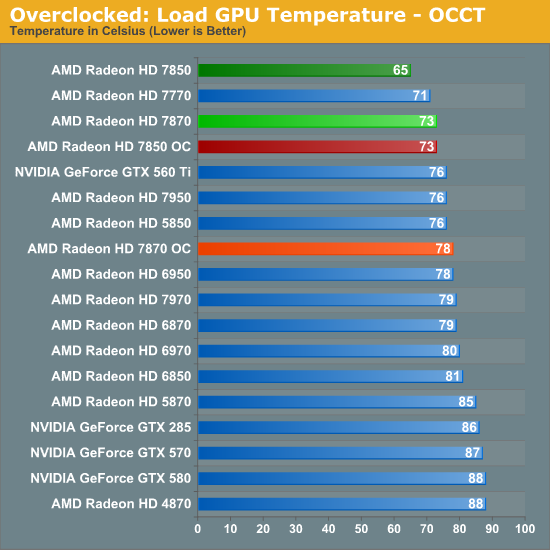
Of course when power consumption goes up so does temperature. For both cards under Metro and for the 7870 under OCCT this amounts to a 5C increase, while the 7850 rises 8C under Metro. However as with our regular temperature readings we would not suggest putting too much consideration into the 7950 numbers since it’s using a non-retail design.
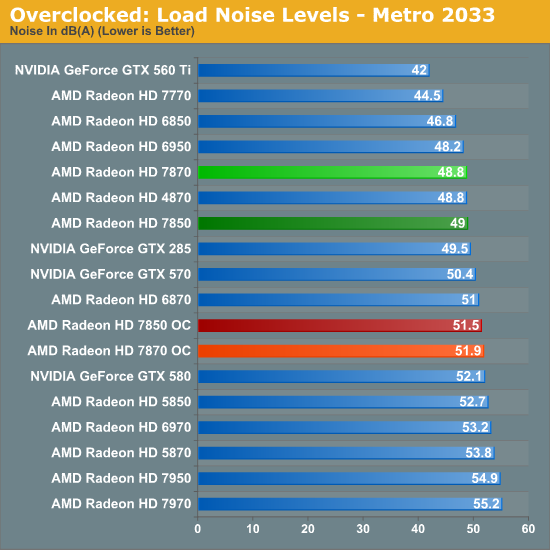
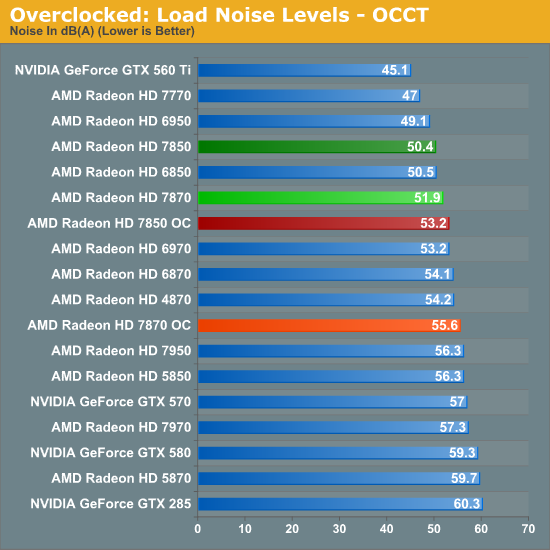
AMD’s conservative fan profiles mean that what are already somewhat loud cards get a bit louder, but in spite of what the earlier power draw differences would imply the increase in noise is rather limited. Paying particular attention to Metro 2033 here, the 7870 is just shy of 3dB louder at 51.9dB, while the 7850 increases by 2.7dB to 51.5dB. OCCT does end up being worse at 2.8dB and 3.7dB louder respectively, but keep in mind this is our pathological case with a much higher PowerTune limit.










173 Comments
View All Comments
Taft12 - Monday, March 5, 2012 - link
Or don't. It's not on sale for 2 weeks yet.MySchizoBuddy - Monday, March 5, 2012 - link
NOT with 1/16 the FP64 performance.Zoomer - Wednesday, March 7, 2012 - link
FP64 is useless for games for the foreseeable future.CeriseCogburn - Thursday, March 8, 2012 - link
I love the "further image quality improvements page" which delicately and carefully explains how amd did a wonderful job of making things better as the image quality degrades...After noting the degredation very, very lightly and tossing out the problem, it is declared "unnoticable" for "all intents and purposes".
Eventually amd's IQ is going to be so far behind nvidia's the endless denials and it doesn't matters - will just continue since amd can crank an extra 20 fps doing it...
LOL
A "gift" from amd.
MySchizoBuddy - Monday, March 5, 2012 - link
where is the double precision compute benchmarksCeriseCogburn - Friday, March 9, 2012 - link
Article: " As AMD began winding down Cayman (6900 series) almost immediately with the launch of the 7900 series, at this point the 6900 market has effectively dried up. Having taken themselves out of competition with themselves, AMD’s only competition is NVIDIA’s lineup."--
And there we have it - AMD and their evil plot to squeeze every last dollar out of those "they care about", the gamers...
I don't want to hear Nvidia is evil anymore.
Time to look in the mirror amd users.
--
Furthermore, it's time the reviewers start slamming AMD the way they slam Nvidia, in this case, one can consider it PRAISE for AMD "drying up their own card channels"- and if that isn't bias I don't know what is.
dagamer34 - Monday, March 5, 2012 - link
These cards don't seem like such a wonderful value considering what the 6900 series was offering, but since those cards have gone poof, I guess you'll have to settle for the 7800 series? It really just seems like they are adjusting their pricing scheme to be less compressed than it was before.TL: DR; If you've got a 6900 series card, the 7000 series is not for you.
Jedi2155 - Monday, March 5, 2012 - link
I still have my wonderful 5870 I purchased in 2009 (which now is not far from 3 years ago...), and still waiting for something that offers more performance than the 7970. Com'on Nvidia! Blow everything out of the water please....Death666Angel - Monday, March 5, 2012 - link
"TL: DR; If you've got a 6900 series card, the 7000 series is not for you."I'd say the 30 to 50% increase of the 79xx to 69xx cards could be well worth it. However, unless you run a multi-monitor setup or have a 2560 resolution, you really should think twice about spending that amount of money on these cards. But I guess people with that kind of cash can either do their own thinking or don't have to care too much about spending and can afford to "BUY ALL THE CARDS".
I'm still running a HD5770 and have a newly acquired 27" monitor here that is really stressing it. I think I'll go for a 78xx and later upgrade to CF because my 550W PSU can handle it with these cards, whereas HD69xx would be stressing it too much. :-)
cactusdog - Monday, March 5, 2012 - link
"TL: DR; If you've got a 6900 series card, the 7000 series is not for you."Thats the dumbest statement I have ever read here. The 7970 is DOUBLE the performance of the 6970 with overclocking. Even the $250 7850 beats the 6970 with overclocking.
The 7 series is the biggest performance jump over the previous series since I have followed graphics cards, since 1998.